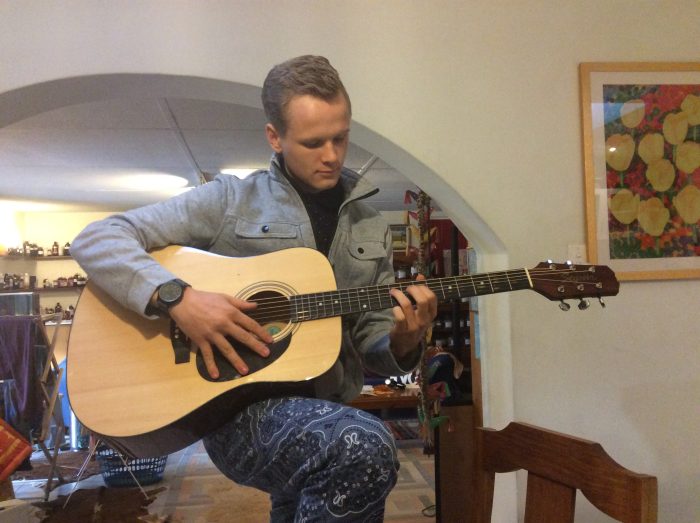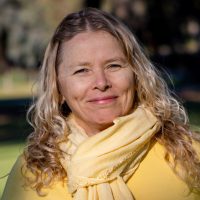And I am okay.
It’s almost five years since my son, then aged 20, died of cancer.
It’s the hardest thing I have ever lived through.
At age 18, Jared was diagnosed with osteosarcoma while alone in a doctor’s office. It was his first visit to the doctor on his own. An X-ray for a sore knee—no big deal for a gymnast. Instead, it was a rare bone cancer. The only reason the GP knew what it was is because he had seen it back in an African hospital.
Osteosarcoma has a 65 percent, five-year survival rate, with chemo and surgery. And those stats have not improved in decades. It’s not a nice cancer. Childhood leukemia, by contrast, has something like a 95 percent survival rate nowadays. (No cancer is nice, of course.)
Jared, at first, handled it well then didn’t. The gruelling treatment hit him hard. He became depressed. He wasn’t coping, despite a lot of loving support.
~
One of the most important things you can do for your vagina and your sex life—to avoid a world of problems later? Check out this device and get a free bag of craft coffee (code; EJCOFFEE)>>
~
After one round of chemo (which means 10 weeks of three types) and the operation to remove half his left femur and replace it with a titanium rod, he decided…no more toxic treatments. He would not budge. He was over 18.
And he lived a beautiful, brave 16 months after that, much of it apparently healthy. He travelled to Japan and got immunotherapies. He made amazing new friends. He became a man. He became mature, wise, and so deep.
We tried everything we could. He died with me in the Philippines, getting treatments.
It was my birthday too. That was like him. Dark humour. A scorpio.
It was a relief by then. He was not in good shape. A beautiful young man, reduced to spidery limbs, heart beating too fast as tumours pressed against it. Unable to swallow.
We were in a small clinic setting. Not a hospital. No doctor. Just us. It was perfect in its own way. He wasn’t in much pain thankfully.
But the grief. The grief started long before he died. I had to moderate my grief and keep it away from him because he had his own to carry. I was his rock. And my husband was my rock—the one I poured out my grief to while Jared was alive. And afterward.
When he died, we adored that beautiful body for the last time, got him cremated, and sat there while it burned on the other side of a flimsy screen. And I heard my son’s voice by my right ear telling me he was okay. We both felt him soaring free of that poor body that had become hell. There was joy amidst it all. And he told me he would always be with me.
Despite feeling connected to my boy beyond his body, the grief was strong.
My balm was to talk about it, to talk about Jared, to share all the stories of the last weeks with people. Many people do not know how to be with someone in deep grief. Some do because they have been there. My husband and I asked people to send us their love, not their grief. Mostly, we stayed alone and let those first storms of intense grief pass through.
As many have said before me, grief comes in waves. Extremely strong at first. Slowly, over months and years, they become more gentle, unless the grief is complicated. Mine wasn’t, and I am grateful for that.
My experience has been free of guilt. We tried everything; we honoured Jared’s wishes. We had lots of time to prepare and express love; it was not a shock. We had said our goodbyes. It was complete.
I had also been learning, with help from many sources, how to hold the deep pain of it. To let it pass through. How not to tell myself terrible stories, how not to let my mind interfere. I am a longtime meditator. I am so glad for having some skill in letting the crazy mind be.
I have always felt connected to the thousands of mothers who have lost children throughout history right up to the present. It used to be much more common. When it happens to you, you realise it is more common than you thought—but hidden.
And I am okay, more than okay. I am privileged, blessed. It is hard, but life is often hard. I love my son with all my heart—in the present moment. Yes, for a long time, there is a reorientation in the psyche because he is no longer walking around “out there” in a body. That is physically painful. Grief has been a visceral physical experience. The literal pain—ache—in the heart area.
There has been humour. A sense he is still around or comes and goes, looking after us. Sometimes playing jokes or turning lights on and off. I talk to him often. We thank him for good things that happen. I sense he is okay and wants me to be okay. Now, I feel him by looking inward, by tuning in.
There is work to do, dishes to wash, a daughter to love and spend time with. Grandchildren, gardening, sunshine, the ocean, friends.
Life keeps going in all its beauty and challenges.
That’s the thing that surprised me at first. I could not imagine life after Jared. It seemed impossible that life could continue. Yet, that same day he left his body, we had to find food, we had to make plans, life just kept moving and has ever since. It seems time should stop for such a momentous event. It doesn’t.
The funny thing about grief is that it is painful, but you don’t want it to go away either. It is a connection to the loved one who has died. I learned I don’t need to hold onto it, to cling to grief. It comes and goes of its own accord. I don’t mind when it is here. I sink into the sadness for moments, and sometimes the big waves crash over for a while. But there is a trust that the intensity will pass once more. My capacity to feel and hold compassion also grows.
I am drawn to write about it because I read one woman’s account of losing her child and saying she is okay. I read it before Jared died, and I held it close in my heart, just in case I ever needed to know that. That it could be okay, that there could be joy in life after the death of my child. It is my reality now.
And I want you to know, just in case.
~
Ready to join?
Hey, thanks so much for reading! Elephant offers 1 article every month for free.
If you want more, grab a subscription for unlimited reads for $5/year (normally, it's $108/year, and the discount ends soon).
And clearly you appreciate mindfulness with a sense of humor and integrity! Why not join the Elephant community, become an Elephriend?
Your investment will help Elephant Journal invest in our editors and writers who promote your values to create the change you want to see in your world!
Already have an account? Log in.
Ready to join?
Hey, thanks so much for reading! Elephant offers 1 article every month for free.
If you want more, grab a subscription for unlimited reads for $5/year (normally, it's $108/year, and the discount ends soon).
And clearly you appreciate mindfulness with a sense of humor and integrity! Why not join the Elephant community, become an Elephriend?
Your investment will help Elephant Journal invest in our editors and writers who promote your values to create the change you want to see in your world!
Already have an account? Log in.
Ready to join?
Hey, thanks so much for reading! Elephant offers 1 article every month for free.
If you want more, grab a subscription for unlimited reads for $5/year (normally, it's $108/year, and the discount ends soon).
And clearly you appreciate mindfulness with a sense of humor and integrity! Why not join the Elephant community, become an Elephriend?
Your investment will help Elephant Journal invest in our editors and writers who promote your values to create the change you want to see in your world!
Already have an account? Log in.

 Share on bsky
Share on bsky







Read 11 comments and reply